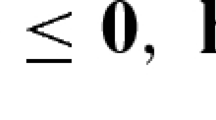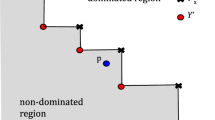Abstract
Many important combinatorial optimization problems can be expressed as constraint satisfaction problems with soft constraints. When problems are too difficult to be solved exactly, approximation methods become the best option. Mini-bucket Elimination (MBE) is a well known approximation method for combinatorial optimization problems. It has a control parameter z that allow us to trade time and space for accuracy. In practice, it is the space and not the time that limits the execution with high values of z. In this paper we introduce a new propagation phase that MBE should execute at each bucket. The purpose of this propagation is to jointly process as much information as possible. As a consequence, the undesirable lose of accuracy caused by MBE when splitting functions into different mini-buckets is minimized. We demonstrate our approach in scheduling, combinatorial auction and max-clique problems, where the resulting algorithm MBE p gives important percentage increments of the lower bound (typically 50% and up to 1566%) with only doubling the cpu time.
Preview
Unable to display preview. Download preview PDF.
Similar content being viewed by others
References
Dechter, R., Rish, I.: Mini-buckets: A general scheme for bounded inference. Journal of the ACM 50, 107–153 (2003)
Bistarelli, S., Fargier, H., Montanari, U., Rossi, F., Schiex, T., Verfaillie, G.: Semiring-based CSPs and valued CSPs: Frameworks, properties and comparison. Constraints 4, 199–240 (1999)
Pearl, J.: Probabilistic Inference in Intelligent Systems. In: Pearl, J. (ed.) Networks of Plausible Inference. Morgan Kaufmann, San Mateo (1988)
Xu, H., Rutenbar, R.A., Sakallah, K.: sub-sat: A formulation for relaxed boolean satisfiability with applications in rounting. In: Proc. Int. Symp. on Physical Design, CA (2002)
Strickland, D.M., Barnes, E., Sokol, J.S.: Optimal protein structure alignment using maximum cliques. Operations Research 53, 389–402 (2005)
Vasquez, M., Hao, J.: A logic-constrained knapsack formulation and a tabu algorithm for the daily photograph scheduling of an earth observation satellite. Journal of Computational Optimization and Applications 20(2) (2001)
Park, J.D.: Using weighted max-sat engines to solve mpe. In: Proc. of the 18th AAAI, Edmonton, Alberta, Canada, pp. 682–687 (2002)
Kask, K., Dechter, R.: A general scheme for automatic generation of search heuristics from specification dependencies. Artificial Intelligence 129, 91–131 (2001)
Rollon, E., Larrosa, J.: Depth-first mini-bucket elimination. In: van Beek, P. (ed.) CP 2005. LNCS, vol. 3709, pp. 563–577. Springer, Heidelberg (2005)
Cooper, M., Schiex, T.: Arc consistency for soft constraints. Artificial Intelligence 154, 199–227 (2004)
Dechter, R.: Bucket elimination: A unifying framework for reasoning. Artificial Intelligence 113, 41–85 (1999)
Bertele, U., Brioschi, F.: Nonserial Dynamic Programming. Academic Press, London (1972)
Larrosa, J., Schiex, T.: Solving weighted csp by maintaining arc-consistency. Artificial Intelligence 159, 1–26 (2004)
Cooper, M.: High-order consistency in valued constraint satisfaction. Constraints 10, 283–305 (2005)
Bensana, E., Lemaitre, M., Verfaillie, G.: Earth observation satellite management. Constraints 4(3), 293–299 (1999)
Leuton-Brown, Y.S.K., Pearson, M.: Towards a universal test suite for combinatorial auction algorithms. ACM E-Commerce, 66–76 (2000)
Johnson, D.S., Trick, M.: Second dimacs implementation challenge: cliques, coloring and satisfiability. DIMACS Series in Discrete Mathematics and Theoretical Computer Science. AMS, vol. 26 (1996)
Author information
Authors and Affiliations
Editor information
Editors and Affiliations
Rights and permissions
Copyright information
© 2006 Springer-Verlag Berlin Heidelberg
About this paper
Cite this paper
Rollon, E., Larrosa, J. (2006). Mini-bucket Elimination with Bucket Propagation. In: Benhamou, F. (eds) Principles and Practice of Constraint Programming - CP 2006. CP 2006. Lecture Notes in Computer Science, vol 4204. Springer, Berlin, Heidelberg. https://doi.org/10.1007/11889205_35
Download citation
DOI: https://doi.org/10.1007/11889205_35
Publisher Name: Springer, Berlin, Heidelberg
Print ISBN: 978-3-540-46267-5
Online ISBN: 978-3-540-46268-2
eBook Packages: Computer ScienceComputer Science (R0)




